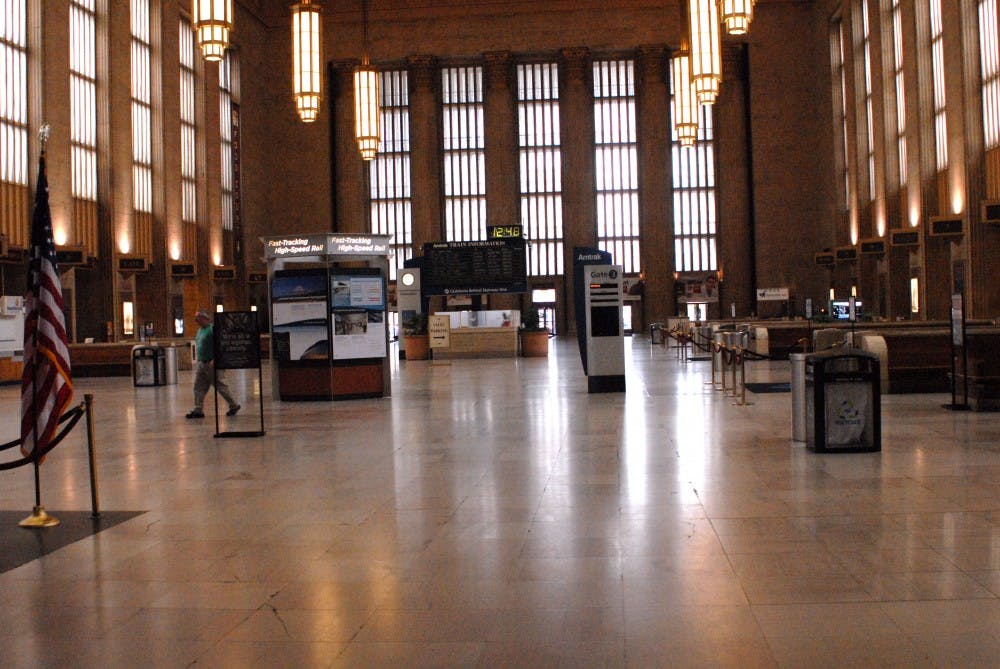At least one Penn student was in the Amtrak train that derailed two weeks ago.
Engineering senior and former Daily Pennsylvanian staffer Josh Pearlstein was seated in the third car of Northeast Regional Train No. 188, which was traveling from Washington, D.C. to New York before it went off the tracks.
Eight passengers died in the accident, with all other passengers being accounted for now.
Pearlstein boarded the train at 30th Street Station and planned to get off in Newark, N.J. He had been on the train for about 10 minutes before he felt the car going too fast around a bend.
“It didn’t occur to me that the train was going too fast until we turned,” he said.
Trains are generally restricted to 50 miles per hour upon entering the curve, Robert Sumwalt, a National Transportation Safety Board official, said in a news conference. The Amtrak train was clocked at 106 mph — over twice the speed limit — before beginning its turn.
“The first real feeling I felt was leaning to one side and then we just kept leaning — tilted beyond the point of where you’re supposed to. And then everyone started screaming,” Pearlstein recalled.
After the train derailed, the first three cars toppled over and fell down the sloping field next to tracks in the Frankford section of northeast Philadelphia. As the third car fell completely on its side, gravel “came through the train window, so everyone was full of dust and dirt,” he said.
“The glasses had broken, windows had broken, people had rolled out,” he recalled.
Pearlstein, who sustained a head injury with some bruises, was taken by police to Aria Frankford Hospital around 11 p.m. or 12 a.m. the night of the crash. The passengers who were in critical condition were brought first to area hospitals, including Aria Frankford and Temple University Hospital. Pearlstein was released the morning after the derailment and brought home to Newark.
Other passengers in the first few cars did not survive the night.
“There were people [that were] incredibly injured and there may have been fatalities in my train car,” Pearlstein said.
“I was very lucky.”
Nearly two weeks after the derailment, passengers began receiving back some of their luggage that had been lost in the accident.
“I got some of my stuff back, but lost some things,” Pearlstein said in a later interview on May 25.
Amtrak also reached out to passengers about compensating for lost luggage.
“They said I should be getting a letter in the mail with compensation information in the next few days,” Pearlstein said.
Amtrak had been mandated by Congress to install a safety system called positive train control along all of its rail lines. This safety mechanism, which according to The New York Times is designed to “keep trains below maximum speed,” was not implemented in the area where the train derailed. Positive train control has been installed in three other sections along the Northeast Corridor.
On Wednesday morning, Congress denied a bid to raise Amtrak’s funding in a 30-21 vote out of a committee meeting of the House of Representatives. Democrat leaders harshly criticized their Republican colleagues for denying the train operators more funding.
“It is absolutely stunning to me,” Former Democratic Pennsylvania Governor Ed Rendell said of the funding vote to The New York Times. Rendell, a 1965 College graduate, has been vocally critical of Congress for not funding infrastructure in the past.
“It shows that ideology trumps reality, and it shows that cowardice reigns in Washington. The callousness and disregard was shockingly contemporaneous,” he said.
On Friday, Amtrak sent an email to its subscribers from President and Chief Executive Officer Joe Boardman.
“Amtrak takes full responsibility and deeply apologizes for our role in this tragic event,” Boardman wrote in the email.
He also described the formation of a Family Assistance Center in Philadelphia “to work closely with the family of passengers and crew on the train.”
Boardman did not reveal any findings about the cause of the accident, though he affirmed Amtrak’s commitment to “completing Positive Train Control implementation in the Northeast Corridor by December of 2015.”
Earlier this week, investigators confirmed that the engineer of the train, Brandon Bostian, made calls and texts on his cell phone the day of the derailment. According to NBC News, it was not confirmed whether he used his phone while conducting the train.



